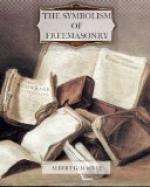NUMBERS. The symbolism of sacred numbers, which prevails very extensively in Freemasonry, was undoubtedly borrowed from the school of Pythagoras; but it is just as likely that he got it from Egypt or Babylon, or from both. The Pythagorean doctrine was, according to Aristotle (Met. xii. 8), that all things proceed from numbers. M. Dacier, however, in his life of the philosopher, denies that the doctrine of numbers was taught by Pythagoras himself, but attributes it to his later disciples. But his arguments are not conclusive or satisfactory.
O
OATH OF SECRECY. It was always administered to the candidate in the ancient Mysteries.
ODD NUMBERS. In the system of Pythagoras, odd numbers were symbols of perfection. Hence the sacred numbers of Freemasonry are all odd. They are 3, 5, 7, 9, 15, 27, 33, and 81.
OIL. An element of masonic consecration, and, as a symbol of prosperity and happiness, is intended, under the name of the “oil of joy,” to indicate the expected propitious results of the consecration of any thing or person to a sacred purpose.
OLIVE. In a secondary sense, the symbol of peace and of victory; but in its primary meaning, like all the other Sacred plants of antiquity, a symbol of immortality; and thus in the Mysteries it was the analogue of the acacia of the Freemasons.
OLIVER. The Rev. George Oliver, D.D., of Lincolnshire, England, who died in 1868, is by far the most distinguished and the most voluminous of the English writers on Freemasonry. Looking to his vast labors and researches in the arcana of the science, no student of masonry can speak of his name or his memory without profound reverence for his learning, and deep gratitude for the services that he has accomplished. To the author of this work the recollection will ever be most grateful that he enjoyed the friendship of so good and so great a man; one of whom we may testify, as Johnson said of Goldsmith, that “nihil quod tetigit non ornavit.” In his writings he has traversed the whole field of masonic literature and science, and has treated, always with great ability and wonderful research, of its history, its antiquities, its rites and ceremonies, its ethics, and its symbols. Of all his works, his “Historical Landmarks,” in two volumes, is the most important, the most useful, and the one which will perhaps the longest perpetuate his memory. In the study of his works, the student must be careful not to follow too implicitly all his conclusions. These were in his own mind controlled by the theory which he had adopted, and which he continuously maintained, that Freemasonry was a Christian institution, and that the connection between it and the Christian religion was absolute and incontrovertible. He followed in the footsteps of Hutchinson, but with a far more expanded view of the masonic system.
OPERATIVE MASONRY. Masonry considered merely as a useful art, intended for the protection and the convenience of man by the erection of edifices which may supply his intellectual, religious, and physical wants.




